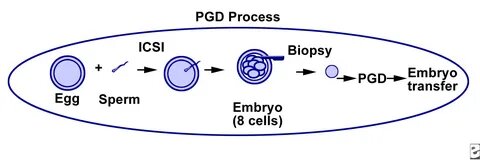- ABOUT
- TREATMENTS & SERVICES
Male Fertility
Genetics & Family Balancing
- SUCCESS STORIES
- CONTACT
- BLOG
PGD – Preimplantation Genetic Diagnosis is a test to detect chromosomal abnormalities in the embryo. This laboratory procedure is performed in conjunction with IVF (In-vitro fertilization), in which the eggs and sperm are united in an outside environment to increase the chances of pregnancy in an infertile couple. PGD is required when either partner carries a genetic abnormality, which could be passed on to their child. If you are diagnosed with a genetic disorder, IVF with PGD can mitigate the risk of the child inheriting your genetic disorder.


Let’s understand the breakdown of the PGD process:
PGD is a part of the IVF process, in which the woman’s eggs are retrieved through a minimally invasive procedure. Before that, the woman receives hormonal shots that stimulate the production of multiple eggs.
The scientist carefully extracts one or two cells from the blastocyst without destroying the cell mass. These cells are sent into the lab for genetic screening.
The selected embryos are then transferred into the woman’s uterus through a minimally invasive procedure. The procedure involves inserting a catheter through the cervix into the woman’s uterine lining. It is performed using an ultrasound. Depending on the genetic screening results and your health, one or more embryos can be implanted into your uterus.
IVF can be performed using fresh and frozen embryos. A couple can decide to freeze a few embryos (if not all of them were implanted into the uterus) for future attempts. In case the IVF cycle fails, they can use these frozen embryos to try again.
PCR—polymerase chain reaction is an effective technique for conducting preimplantation genetic diagnosis. In this process, a single cell is extracted from the fertilized embryo. The DNA sample is collected from this cell and amplified to make screening easier. The procedure is commonly used in cases of single-gene disorder or monogenic disease.
FISH is used to detect chromosomal abnormalities in the embryo, like Down syndrome. The healthcare specialist examines the embryo cells using a special microscope to determine whether they carry the required number of chromosomes. FISH—Fluorescent In Situ Hybridization helps identify the embryo’s chromosomal structure so your doctor can pick the most viable one.
Not every couple that chooses PGD screening is infertile. Some can conceive naturally but might experience fetal death at an early stage. Others might fear their child carrying the genetic disorder that runs in their family.
In some cases, the PGD technique is used for family balancing. If a couple wants a child of a certain gender, they can undergo Preimplantation Genetic Diagnosis to separate the male and female embryos. Their selected gender embryo is then implanted into the woman’s uterus.
PGD comes with IVF and is a highly recommended procedure for couples at an increased risk of passing genetic diseases to their offspring. As mentioned above, PGD treatment also helps you identify the gender of the child. Here’s when you should consider PGD:
PGD success rates vary depending on the reason you are considering it. A study shows that the chances of miscarriage drop significantly in women (especially above 35) who undergo PGD testing during their IVF cycle. The test showed a whopping 95% chance of a woman giving live birth after PGD testing.
PGD can help prevent genetic disorders in your offspring, but like any medical procedure, it comes with its share of risks. Let’s check out the benefits and risks of PGD.
PGD pregnancy involves testing the embryo cells for genetic mutation and any chromosomal abnormality. The procedure is a bit complex. The cost of PGD procedure depends on the clinical or medical history of the patient.
For First free Consultation Book Now!
Kindly fill in the form below and your nearest Australian Concept Clinic will respond within 1 hour of receiving your request.
32-A, Rojhan Street, Block 5, Kehkashan, Clifton, Next to PRANZO Restaurant, Behind BBQ Tonight, Near BILAWAL Chowrangi, Karachi, Sindh, Pakistan 75600
116 Babar Block, Barkat Market, Near Salaar Center, Lahore, 54000.
3rd Floor, Aklas Plaza, G10 Markaz, Behind Babri Masjid, Sawan Road, Islamabad.
The Australian Concept Infertility Medical Center “Australian Concept” was established in 1998 with Australian technical collaboration in Karachi, Pakistan.